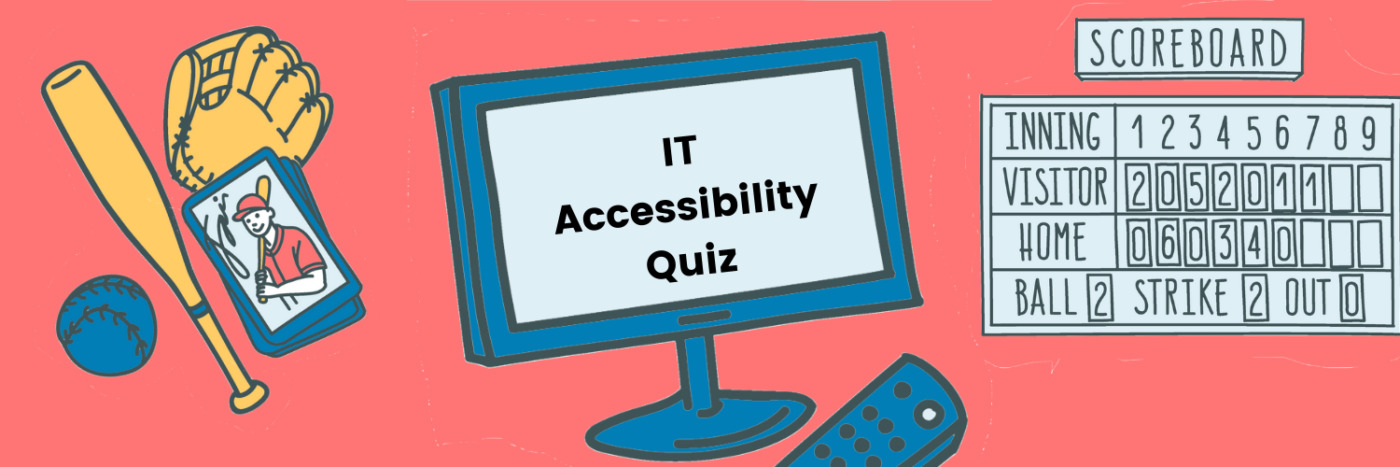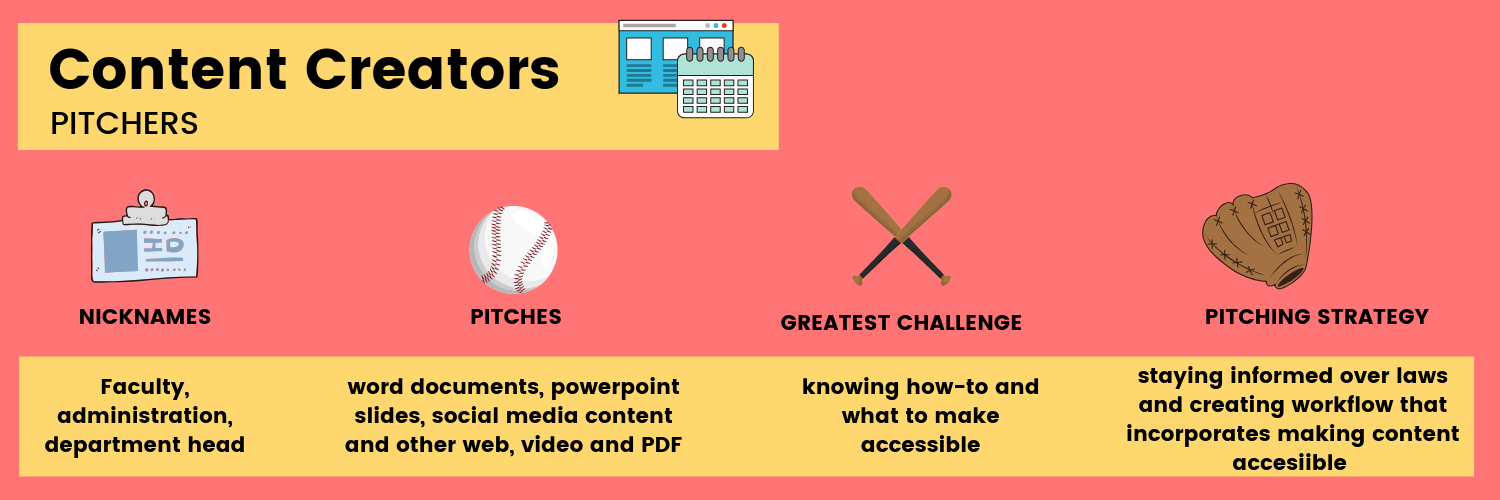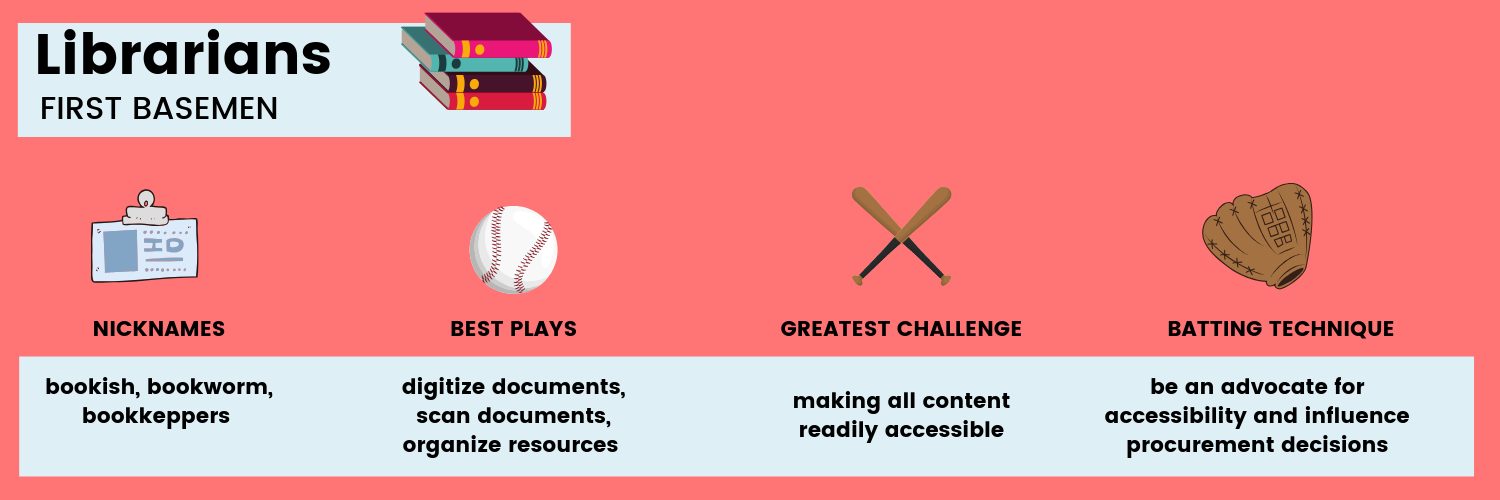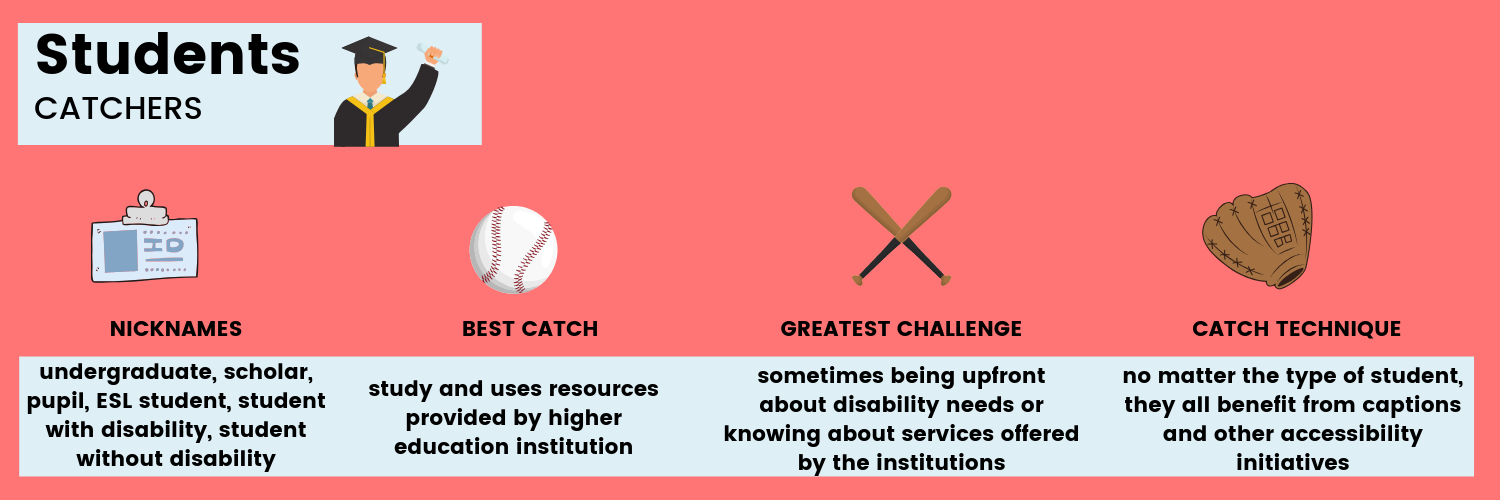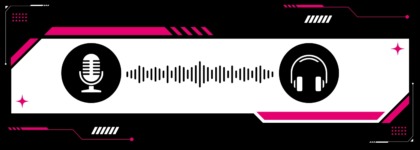Who Needs to Step Up to the IT Accessibility Plate? (QUIZ)
Updated: March 16, 2021
Ever heard the saying, “Teamwork makes the dream work?” When it comes to accessibility on campus, that saying embodies how IT accessibility initiatives should be approached.
It’s hard to define a single role to take charge of accessibility, especially at an institution of higher education. In some form, everyone touches an element of accessibility, and it’s critical that everyone involved is aware and adept to fulfill their role.
As in any sport, players win games, teams win championships.
Today, we are formulating an unstoppable accessibility team for this year’s Major IT Accessibility Baseball League. Please note that the order of the bases does not indicate their level of importance – all roles are equally important. Please also note that the author of this post is a baseball rookie, so terminology could be incorrect.
So batter up because today’s players will be game changers in how your institution will begin to approach IT Accessibility.
Pitchers: Content Creators
To kick off any inning in accessibility, we have the pitchers, aka, content creators. Content creators include anyone who creates documents in Word, PowerPoint slides, PDFs, videos, publishes content to social media and manages content on the web.
Like a pitcher who controls the speed and direction of a ball, content creators have direct control over the color, text, and design of the documents they will disseminate to the students (or the catchers). In other words, content creators are tasked with ensuring their content is accessible.
The challenge for content creators in higher ed is that content creation falls under many roles. Departments and individuals across campus are constantly publishing information, and when accessibility requirements are not explicitly enforced or communicated, there is a lack of awareness over what should be accessible.
As in baseball, not every pitch will be the same, but we can mitigate inconsistencies in our throws/content by educating the content creators on the laws and requirements of accessible content.
First Baseman: Librarians
Beyond the content creators, we have the content hoarders, aka, the librarians, and the first baseman in our accessibility baseball league. Librarians play a key role in accessibility because they have an expansive library of resources that they help organize, digitize, and make more accessible. They are often the first stop for faculty, students, and other admin when they need information for a class. Ensuring content can be equally accessed by all should be at the heart of their operations, which is why they also play a key role in the procurement process.
When a product reaches first base, the librarians must decide if it will fortify accessibility initiatives on campus, or inhibit them. Because they are tasked with digitizing and/or scanning documents the tools they choose to use can directly influence the accessibility of the content. Working with procurement to find tools that aid accessibility is a valuable initiative.
Librarians, like the first baseman, can’t always prevent inaccessible content from passing through first base. Sometimes the tools the university uses or the documents that come to the library are inaccessible. But what librarians can do is be advocates for greater accessibility and use their influence in the decision-making process.
Second Baseman: Multimedia Producers
Coming up on second base we have multimedia producers. Multimedia producers, like many other important roles in accessibility, can fall under an array of existing roles. For example, faculty are multimedia producers when they script and record their lectures, webinars, or other class videos. In other cases, the multimedia producing job is a designated role at a university or incorporated into marketing, human resources, or other departments.
In most universities, multimedia producers are the ones left responsible for doing the transcription and captioning of videos. Of course, there are challenges to getting videos captioned, but multimedia producers can use their power to ensure the videos they stream out can support captioning and be enjoyed in different forms. Furthermore, multimedia producers can choose to use more accessible video players. In many cases, this means voicing an opinion about the learning management systems used at the institution.
In the world of accessibility, multimedia producers have an important role to ensure the content they disseminate can provide the same experience for all viewers. Their influence can serve as the ignition for greater awareness about accessibility.
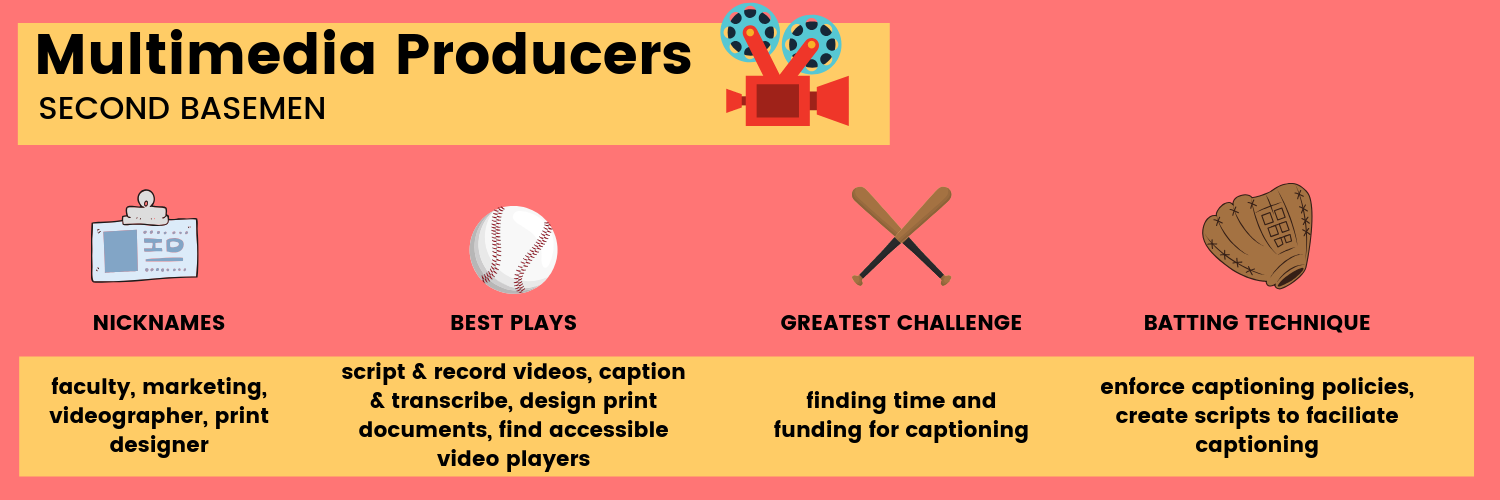
Third Baseman: Human Relations
Human relations (HR) professionals can be direct influencers for accessibility because they manage the hiring process. This key player in our accessibility baseball league can inject accessibility into job descriptions, interviews, and training.
As in baseball, the third baseman prevents the opposing team from reaching home base, in human relations, this means ensuring no new hire is unaware of the importance of accessibility at their institution. So, when it comes to job descriptions, HR can add accessibility as a requirement or preferred skill. They can also incorporate accessibility training into online or web-based office training to help cast a wider net of awareness.
The challenge with HR and accessibility is that if accessibility initiatives are not actively being implemented at an institution, it can be easy to overlook this important hiring requirement. Yet, with the advent of more stringent accessibility laws, even if an institution has only a handful of students with disabilities, it’s important to keep accessibility top of mind. After all, accessibility initiatives benefit all students, not just students with disabilities.
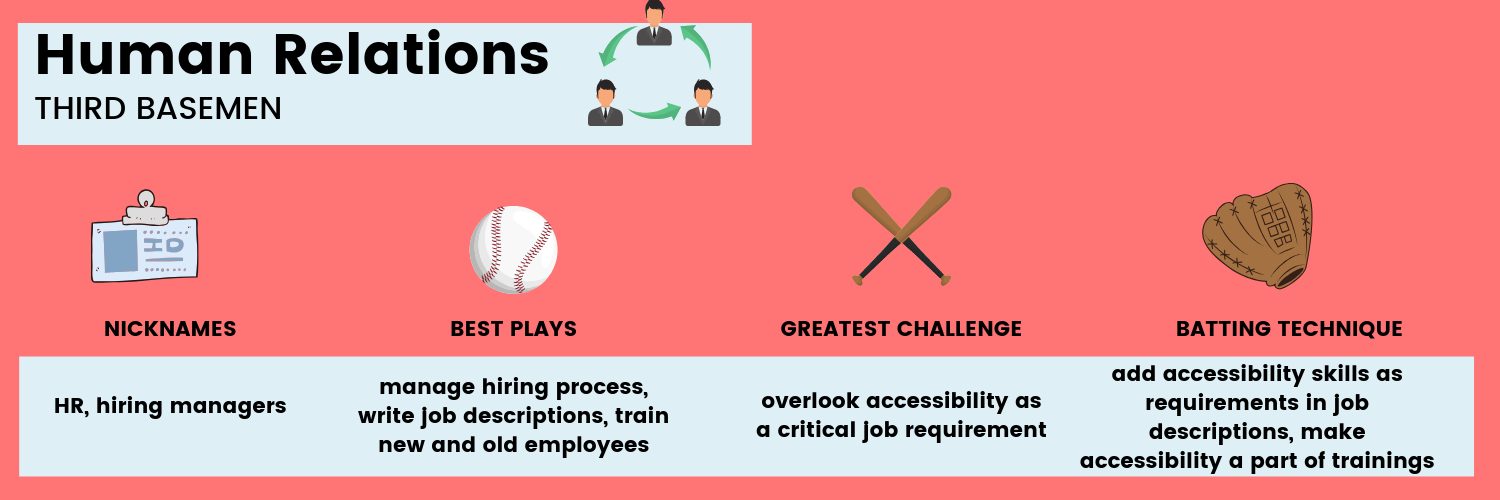
Left Fielder: Project Managers
Project managers are your all-star players who can easily integrate with other positions on the field. In many cases, project management is usually injected into other roles.
Project managers have the ability to influence how accessibility fits into the project. For example, project managers can choose their team and set accessibility skills as a priority. Project managers tend to do a lot of process integration so they can recognize processes that work, processes that don’t work, and see how automation can help. Furthermore, project managers do a lot of documentation, so they have direct influence over the standards for dissemination.
Project managers can facilitate a workflow that integrates accessibility, setting precedent for future projects.
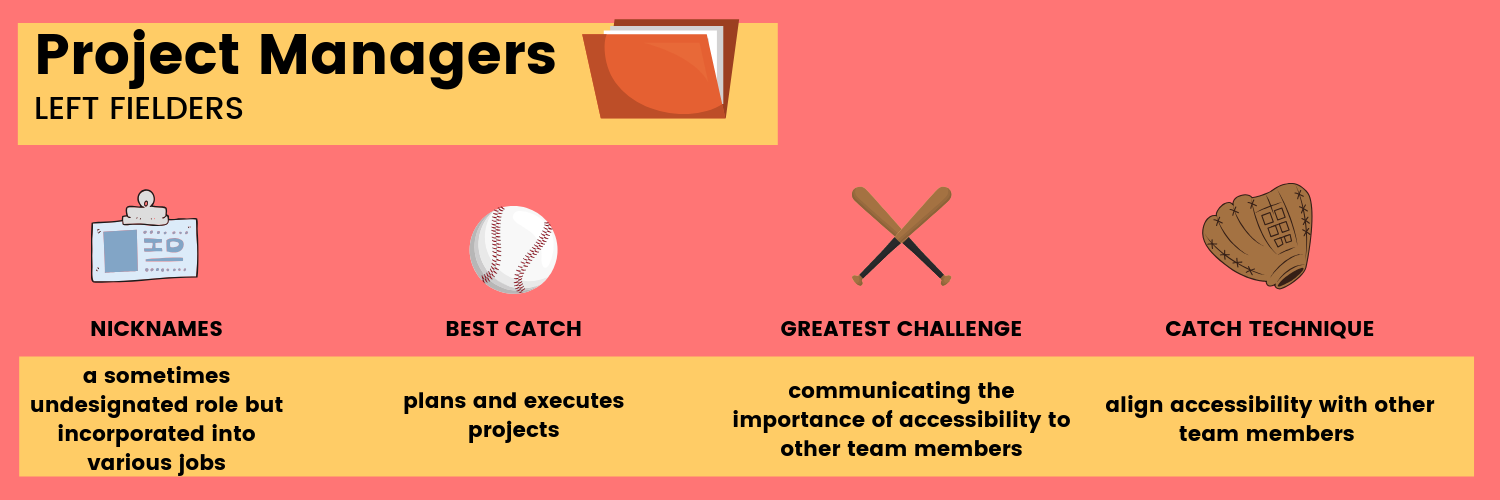
Center Fielder: Management and Leadership
Management and leadership are without question key players for greater accessibility on campus, which is why they play center field. Management and leadership overlook all accessibility initiatives on campus and can serve as powerful advocates that can encourage others into taking action.
Management and leadership’s advocacy can also be translated through resource allocation. When resources are sparse, management and leadership can be a key player in ensuring resources are allocated for accessibility.
It can seem daunting to reach out to management and leadership but keep in mind they have the same goal of making education more equal and accessible.
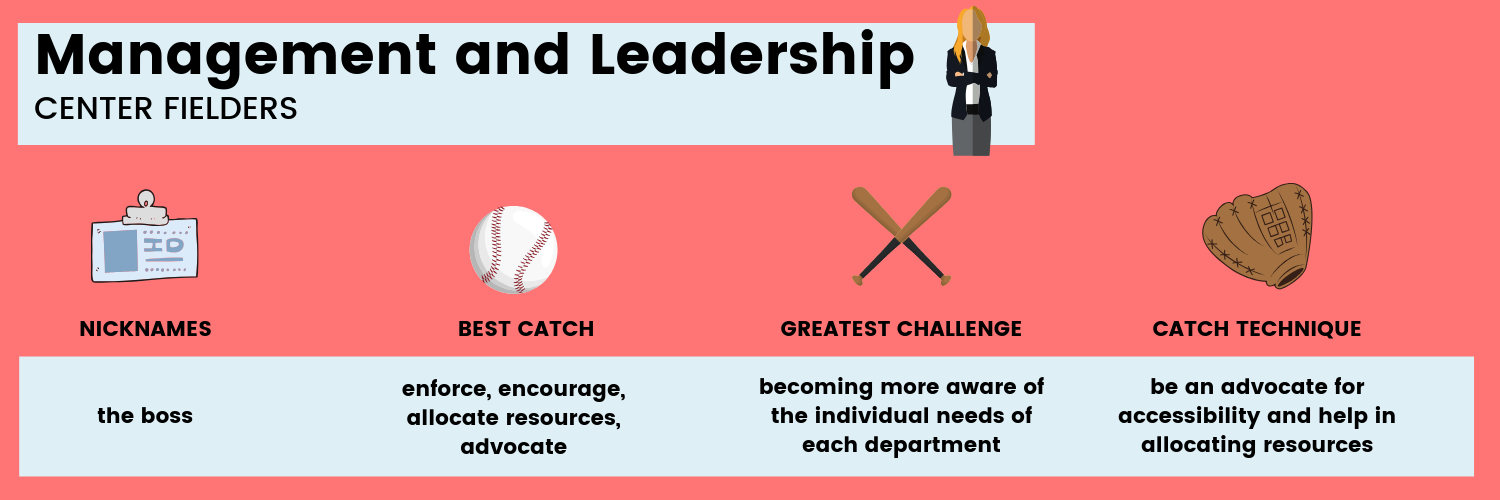
Right Fielder: Procurement
Our final player is procurement. Procurement holds the purchasing power, meaning they can help obtain the resources that allow greater accessibility. Procurement’s role should be to work with other key players and analyze the tools they buy support accessibility.
It’s true that some solutions may not seem perfect in the beginning, but more often than not, you can take care of the bigger issues. A home run in procurement means that at least accessibility is being considered in the decision-making process.
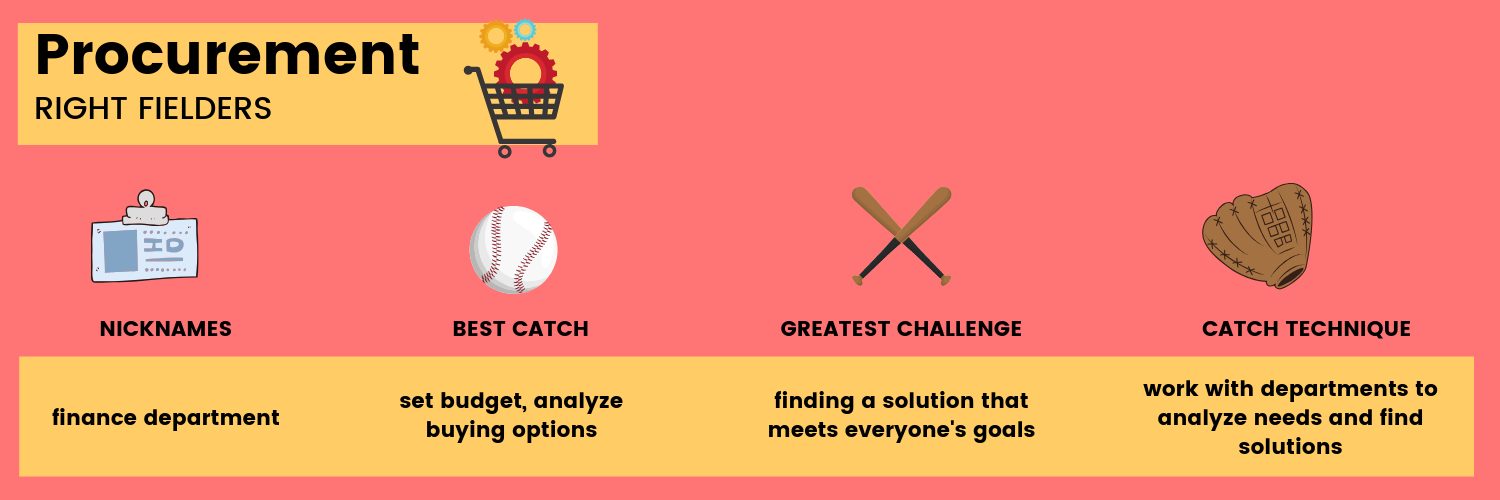
Catcher: Students
Ultimately the goal of accessibility initiatives is to benefit the students. If it’s the institutions turn to bat, the goal should be to ensure all content can get a home run, without errors or compliance issues. Students are at the receiving end of all content, and if they are unable to acquire access to the content produced by a university, it defeats the purpose and role of education.
Your Position on Your IT Accessibility Team
As in baseball, it’s what you do before the season starts that makes you a champion. In other words, get your staff prepared on how their role fits into accessibility before the requests or even the legal department steps on the plate.
In our fantasy accessibility baseball league, our team keeps the inaccessible content out and attempts to score as many home runs as they can. Very rarely do baseball teams have undefeated seasons, they are often met with opposition and challenges. But it’s clear the overlaps in these roles mean achieving accessibility is a team effort and no one person should be responsible. When one person or department complies, a domino effect is put in motion and ultimately it begins to lead towards true equality in education.
Want to learn more? Watch the full webinar below!
Further Reading

Subscribe to the Blog Digest
Sign up to receive our blog digest and other information on this topic. You can unsubscribe anytime.
By subscribing you agree to our privacy policy.


